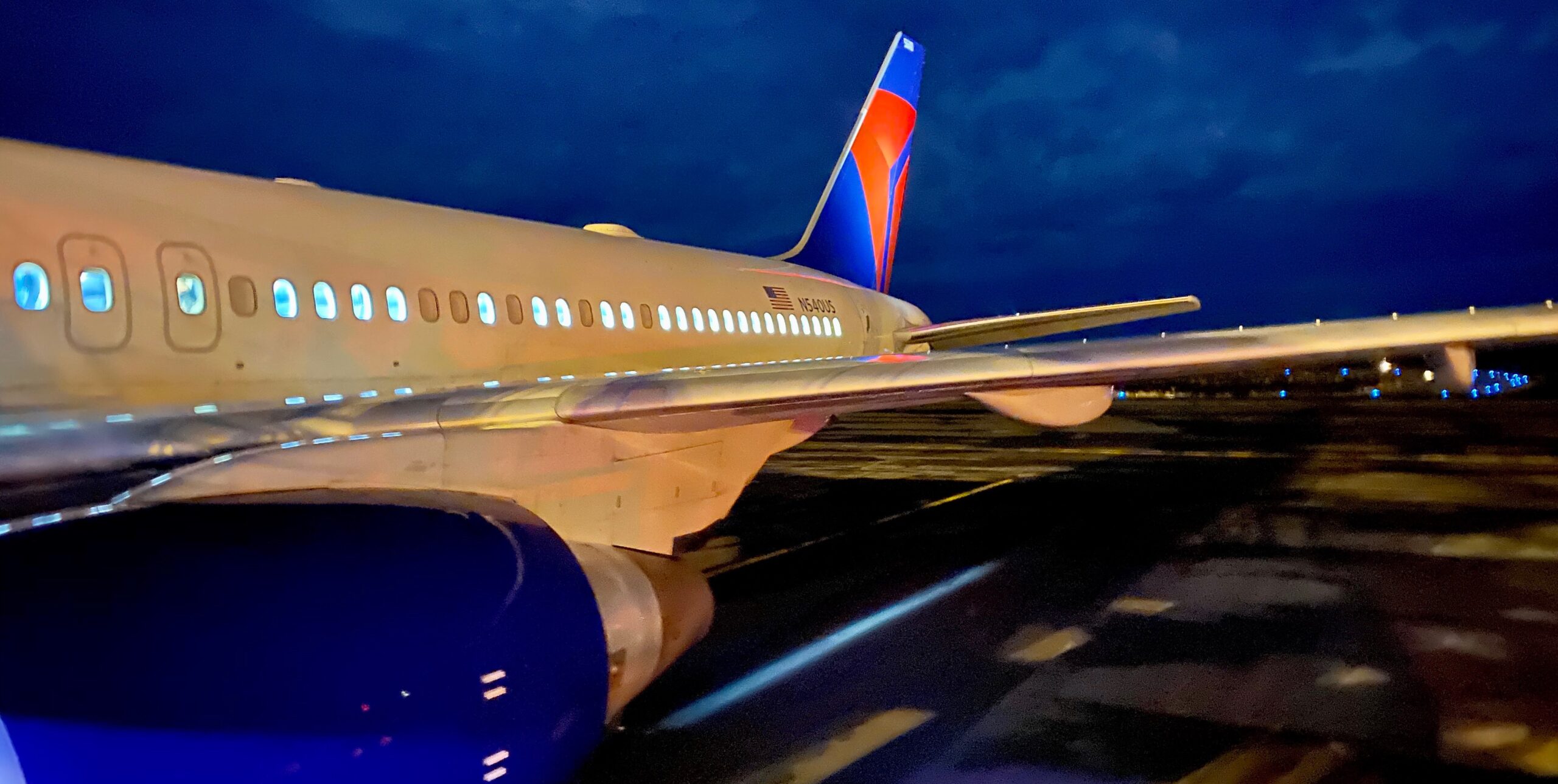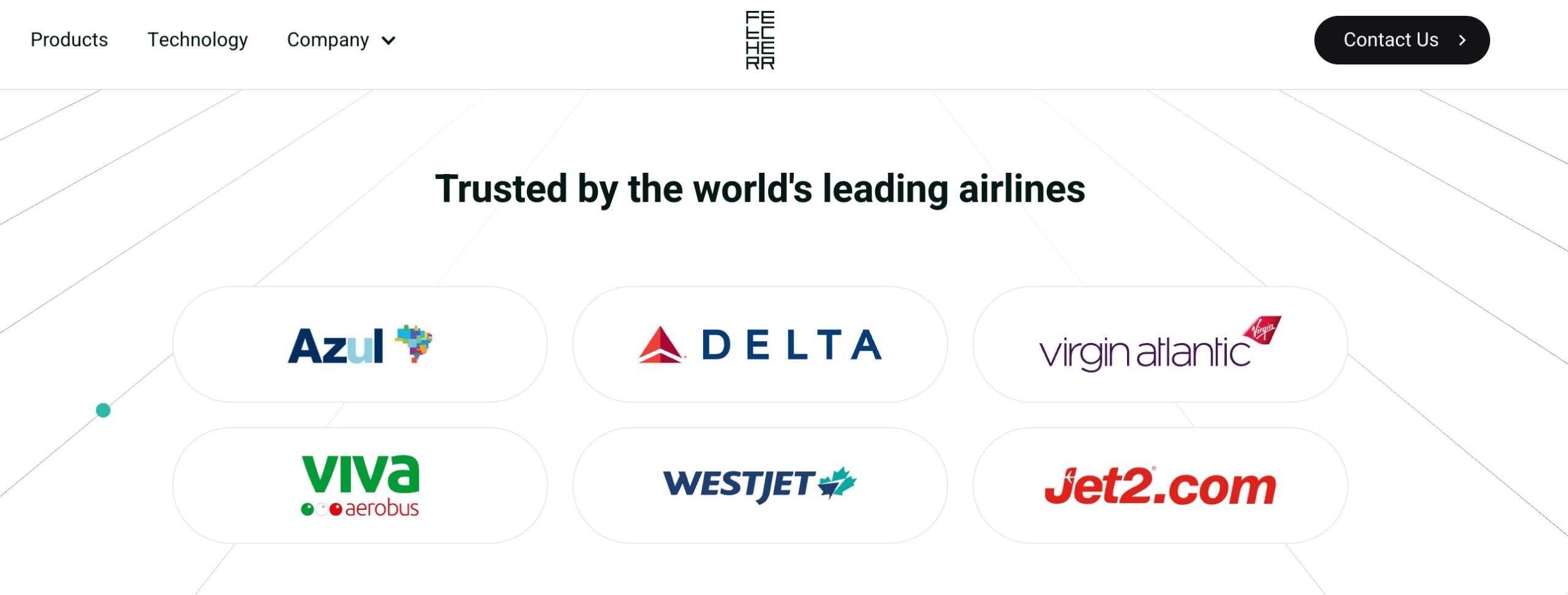Delta dropped a metaphorical bomb into the travel world last month when executives let slip that they're using artificial intelligence (AI) to set 3% of domestic fares … with plans to ramp that up to 20% by the end of the year. Cue another national backlash.
But what does that really mean? Are Delta and other airlines already using your personal data to set individualized airfare – or, as Delta has since come out to insist, is that too far? What are other airlines doing with AI? Is this even legal? And what could all this mean for the wide world of flight deals?
We've got some answers – and some thoughts about where this is going.
- Are airlines like Delta already using my data to set airfare?
- So then what's really happening with AI & airfare?
- Is it just Delta doing this? Or are other airlines?
- What data could airlines use to set prices?
- Isn't this illegal?
- What has the Trump Administration said?
- How can we avoid this? What can we do?
- What would this mean for flight prices and finding deals?
- What now?
Are airlines like Delta already using my data to set airfare?
No. Not yet, anyway.
Delta set off alarm bells last month when it told investors it was using an AI tool from the startup Fetcherr to set 3% of its domestic fares … and planned to expand that to 20% by the end of the year. Within days, those comments set off a national conversation about data privacy, guardrails for using AI, and the prospect of “surveillance pricing.”
Let me repeat: That's not what's happening right now. But the nuances of how airlines are (and aren't) using AI and personal data got lost in the broader debate about AI, which has become a lightning rod – a real boogeyman that, at least when it comes to corporations, is practically synonymous with nefarious price gouging.
So when Delta said it planned to rapidly expand its use of AI, everyday travelers feared the worst – understandably so. But here's what's really going on today.
Delta is using its AI tool as the engine for the same old dynamic pricing system travelers know and loathe today, with fares that seem to change by the minute. There's an alphabet soup of different fare classes available on every flight, each with its own price. A series of algorithms and airline analysts spend their days adjusting those fares on the fly in order to fill planes at the highest fares possible.
To quote Delta President Glen Hauenstein: AI is their “super analyst,” replacing thousands of manpower hours with technology to tweak fares even faster to maximize revenue.
Pressed by members of Congress to respond to the concern that they were already using customers' data to offer tailored pricing, top Delta executives insisted that's not the case.
“There is no fare product Delta has ever used, is testing or plans to use that targets customers with individualized prices based on personal data,” Peter Carter, the airline's executive vice president and chief external affairs office wrote in a letter to three top Democratic senators late last month. “Furthermore, we have zero tolerance for discriminatory or predatory pricing and fully comply with applicable laws in privacy, pricing and advertising.”
Delta couldn't get away with lying to Congress or investors about its current activities. But that line about what Delta “plans to use” is a much different tune than what Delta was singing just last fall.
So then what's really happening with AI & airfare?
It depends on which Delta you trust.
Do you trust the Delta of today? The airline that now swears to Congress it has absolutely no plans to use personal data to set fare pricing?
Or do you believe the Delta from last year, when Hauenstein shared his vision of getting “inside the mind of our consumer and present them relevant, something that's relevant to them at the right time with the right price”? Do you trust Delta's own AI partner, Fetcherr, which previously bragged about its role in the future “hyper-personalization” of airfare … before scrubbing those mentions from its website last month as the backlash against Delta began?
Make no mistake: The entire airline industry – not just Delta – has been pushing toward the ability. It's not that they don't want to. It's that the technology isn't there yet to let them do so.
As frustrating and opaque as airfare can be to the average traveler, it's built on a shockingly simple, even outdated, system.
Every time you search for a flight, the airline puts you into one of 20-plus pricing buckets — each with its own rules and price. Throughout the day, prices shift as airlines adjust fares within those classes, all while consumer demand ebbs and flows.
The goal for more than a decade has been to transition to a new, modern framework that replaces those fare buckets with fully fledged dynamic pricing – and new distribution systems to share those fares directly with third-party sites from Google Flights to Expedia. Combined with gobs of data on their customers and the power of AI to analyze it all, airlines would have everything they need to begin tailoring fare bundles and even pricing from person to person.
That's still a ways away. But what airlines would call “personalized fare offers” – or everyday consumers and watchdogs would call “surveillance pricing” – is still very much in the cards for the future.
Is it just Delta doing this? Or are other airlines?
This is bigger than just Delta. The Atlanta-based airline has just been loudest about its use of AI.
The entire airline industry – not just in the U.S., but across the globe – has been pushing towards a future where tailored pricing is possible. Heck, Fetcherr alone also lists among its clients:
- The Canadian carrier WestJet
- Britain's Virgin Atlantic and low-cost carrier Jet2
- Mexico's Viva Aerobus
- Brazilian low-cost carrier Azul
There are a half-dozen or more other AI startups focused on airfare out there, so this list is likely far longer. Yet as Delta turned itself into the torchbearer for AI only to cause a backlash, other airlines have gladly seized the opportunity to bash their competitor.
“Consumers need to know that they can trust American,” American Airlines CEO Robert Isom said last month. “This is not about bait and switch. This is not about tricking. And others that talk about using AI in that way, I don’t think it’s appropriate.”
To reiterate: No matter what airline CEOs say today, the entire airline industry – here in the U.S. and across the globe – has been pushing toward some form of personalized fare pricing.
What data could airlines use to set prices?
This is the $1 million question. And right now, we don't have many answers … because as of publication, there are no meaningful limits.
Would airlines simply use your previous purchase history – showing you always check a bag when you fly with them – to offer you a bundle that includes a checked bag from the beginning? That's the simplest (and most innocent) version of what this looks like.
But just a step beyond that, airlines could easily tailor the price of your fare because, for example, you previously paid $249 for a one-way flight from Chicago-O'Hare (ORD) to Atlanta (ATL), they know they don't need to offer you the same $149 price they're offering someone else. That's the easiest way to expand other pricing tactics designed to squeeze more out of business travelers, like solo passenger penalties and the return of higher one-way fare prices.
What's to stop Delta from charging you more for a flight because you're a Delta Platinum or Diamond Medallion with status? You're probably willing to pay more for that flight than a first-time or even occasional Delta flyer, right?
But what about your purchase history with other companies? That's data airlines could easily get from their co-branded credit card partners. Or how about the other gobs of data on individual consumers out there that airlines could easily purchase and fold into their pricing systems?
And what if, as a U.S. congressman troublingly raised, airlines could use your search history to determine that you may be trying to fly somewhere for a funeral and therefore need to get there … and thus may be willing to pay a higher price than normal?
We just don't know.
Isn't this illegal?
No. At least not yet.
Travelers have shockingly few consumer rights in the U.S., and the rise of AI only further highlights that fact. So as the backlash began over Delta's plans for expanding its use of AI last month, Congress quickly jumped into the debate.
A pair of Democratic lawmakers in Congress introduced the “Stop AI Price Gouging and Wage Fixing Act” last month, which would ban corporations from using personal data and AI to charge consumers different amounts based upon their search and purchase history, location, address, gender, race, and more. The bill would also prohibit companies from tailoring wages based on personal data. A bill is also expected to be introduced in the U.S. Senate.
“You shouldn’t be charged more or paid less because of your ZIP code or search history,” Texas Rep. Greg Casar, the House legislation's chief author, wrote on social media. “It’s invasive. It’s exploitative. And it needs to end.”
So far, no Republican lawmakers have joined Casar's bill. And considering both chambers of Congress are controlled by Republicans, it's unlikely that legislation will make any headway until that changes.
What has the Trump Administration said?
Under the Biden administration, former Secretary of Transportation Pete Buttigieg made expanding consumer rights in air travel a core tenet of his tenure. His successor, former Republican Rep. Sean Duffy, has been focused largely on modernizing outdated Federal Aviation Administration (FAA) systems and improving Air Traffic Control operations in the wake of several crashes soon after he took office earlier this year.
But it's on his radar.
Asked at an unrelated press conference last week about Delta's use of AI in pricing, Duffy shared his concern about how far airlines could take their use of AI and personal data while saying he trusted the Atlanta-based airline.
“Do I have a concern about AI pricing? Yes I do,” Duffy said, according to a recording of the exchange. “But to try to individualize pricing on seats based on how much you make or don't make? Or who you are? I can guarantee you that we will investigate if anyone does that.”
“Delta has clarified that they're not going to do that,” he added. “I'll take them at face value.”
How can we avoid this? What can we do?
In the short-term, nothing.
Any use of AI in setting flight prices is simply replacing the manual work airlines have always done to adjust prices. It's the old – and admittedly frustrating – system on steroids.
But we're in the long game now. Given all the work behind the scenes that still needs to be done, we're still likely years away from any widespread use of AI and personal information to set flight prices.
The time to talk about this is now. That's why we're covering every twist and turn in this debate. That's why I'm writing this recap of where things stand right now.
If we wait until airlines do actually deploy AI in order to personalize prices, it'll be too late.
What would this mean for flight prices and finding deals?
I'll admit it: This is an existential question for us here at Thrifty Traveler.
Finding flight deals is what we do, 24/7/365 for our Thrifty Traveler Premium members, readers, and followers on social media. We check new routes or markets where airlines have added additional flights for deals. We watch and wait for airlines to attack each others' hubs, hoping to poach customers with a dirt-cheap price.
Domestically and internationally, two things dictate flight pricing above all else:
- The simple law of supply and demand: If too many travelers are trying to fill planes, airlines will charge higher fares. But when airlines have open seats, they slash prices to attract travelers.
- Competition between the airlines: Despite all the consolidation we've seen across the airline industry over the last few decades, it's still a cutthroat business … and you can see that in flight prices.
But if airlines can use personal data to tailor flight pricing to individuals, it upends everything. How can we tell you that flight prices to Europe have dropped below $400 when some of you might see $475 or $550 fares?
And for you, the everyday traveler, it's no less troubling. Everyone loves finding a stellar deal and beating the airlines at their own game, right?
But if airlines can some day determine exactly how much you're willing to pay for a flight – no more, no less – there's no more bargains. There's just your price.
That's the nightmare scenario, anyway. It's far too early to say whether that's what will come to fruition – and whether there's a tool that could be developed to help us all fight back if it does.
We should start thinking about that, too, shouldn't we?
What now?
We're still in the early innings of the debate and implementation over AI in airfare. Only time will tell where this goes from here.
A few months or years from now, maybe we'll come to see Delta's comment as a trial ballon: a test to see whether consumers would accept … and one that Americans promptly shot down. Maybe airlines will see the nationwide response to the prospect of personalized pricing as a sign they should back off.
But that's wishful thinking. This is the airline business, after all – an an industry whose core mission is to turn bigger profits by maximizing revenues, and they do that by finding new ways to charge their customers more. That's what shareholders expect.
Let me leave you with this.
In a very (albeit dense) overview of the ongoing push to modernize airfare published this spring, the travel industry publication Phocuswire called for transparency – from the airlines and the groups that make the whole travel world spin.
“Airlines and distributors should clearly communicate how dynamic pricing and personalized offers are created, ensuring customers understand the tangible benefits. This openness could mitigate mistrust and empower consumers, making them feel valued and respected rather than exploited.”
One thing is clear: That ship has sailed.









